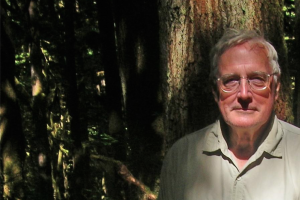
Michael Butler graduated from UBC Law in 1959. After articling at a law firm in Calgary, he started working in the Combines Branch of the Department of Justice in Ottawa. He became a trusted policy official in the Privy Council office, working closely with former Prime Ministers Lester B. Pearson and Pierre Trudeau, before working for the Department of Energy, Mines, and Resources, Department of Transport, and Department of Indian Affairs on policy and problem solving. He also worked for the Treasury Board, where he negotiated the federal share of the 1985 Calgary Olympics. He completed his LLM in company law, tax, and competition policy at the London School of Economics in 1964.
Although he “retired” from government in 1985, work continued to find him, including work for South African and Canadian mining corporations, the Assembly of First Nations, and the Department of Public Works. A highlight was building and managing the competition process for the bridge to Prince Edward Island. Before he finally retired he worked for the Anglican Church among other mainline churches, setting up a settlement procedure to bypass litigation on residential schools.
UBC Law student Kristen Woo recently caught up with Michael to ask him about his career, and his advice for lawyers wanting to work in government.
You’ve had a very long career. What would you consider to be the highlights?
When I worked in the Privy Council office from 1965 to 1970. I started as Cabinet Secretary, but my work later included federal-provincial relations and constitutional matters. I was also Secretary of the first federal-provincial constitutional meetings, where I worked closely with former Prime Minister Lester Pearson. When I was asked to set up and manage the Priorities and Planning Committee of Cabinet, I worked alongside Prime Minister Pierre Trudeau for three years, and while doing this difficult work, gained his and his ministers’ confidence.
What was your primary task in the Privy Council office?
My job was to bring to cabinet the major issues of government policy that affected more than one department or where there was some reluctance among officials to have these issues debated by ministers. My most important task was to make cabinet committees work and to get ministers to work as a team. I had to build and capture a consensus in a way that would result in decisions that, in turn, could be implemented by government.
How did your legal training help you?
You need to learn to listen to a whole range of people, and you start learning that when you deal with clients and go to court. However, training as a lawyer may not teach you how to run cabinet government so that all ministers feel a sense of achievement. Ministers have all sorts of different backgrounds; you have to help them decide what they want done, then help them get it done.
What other qualities made you successful at your job?
My particular skill was that no matter what problems arose, I almost always knew what to do. I spent a long time thinking about things first. This is why Trudeau liked me so much. Later, when I worked in consulting, my clients often said, “We’d really like to know what he’s thinking!” I still spend a long time thinking about things and occasionally writing about them.
Why did you decide to work in government?
I was at a great law firm in Calgary but I looked around me and saw that lawyers became entrapped by their clients and basically got stuck in a law office. I wanted to be freer to move around. Also, I was brought up in English and French, and I like being in every part of the country. You can have a wonderful career in public service – it is exhausting work, but wonderful.
What advice do you have for law students or lawyers who want to work in government?
Never stop reading widely about policy issues of all sorts. Think about them deeply before you start to debate and discuss them. Don’t forget to listen and to read widely beyond strictly government issues. Sports count too.
If you think somebody has a job that you would like to do, cold-call them. If you want to go somewhere, go there. Show up, bang on the door, and talk to them. Really competent people have an urge to mentor and help people.
Now that you’re retired, what are some of your favourite hobbies?
Sailing – it’s one of my great pleasures in life. It reminds me of when I used to work on tugboats in my summers off from law school!
First published on November 29, 2014.